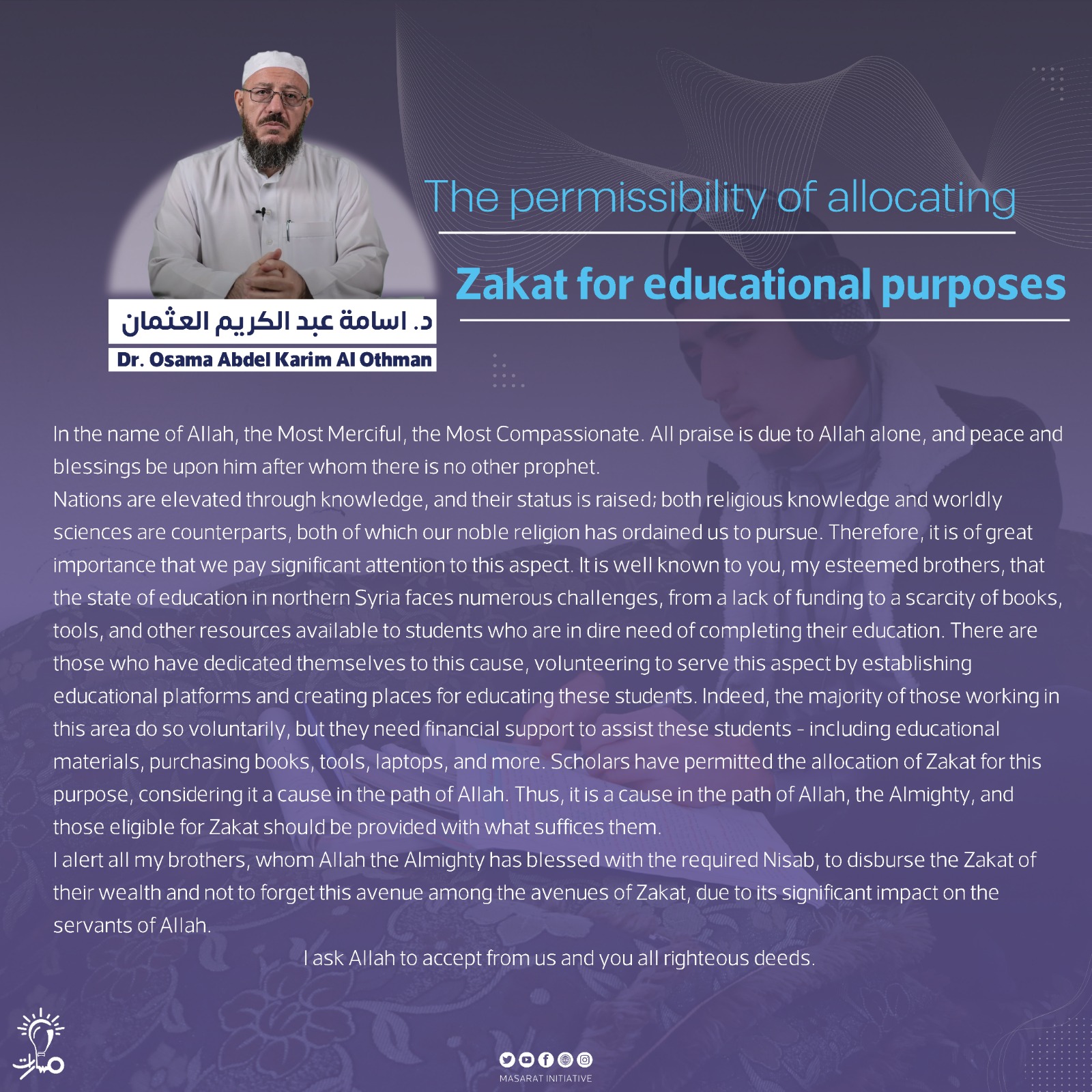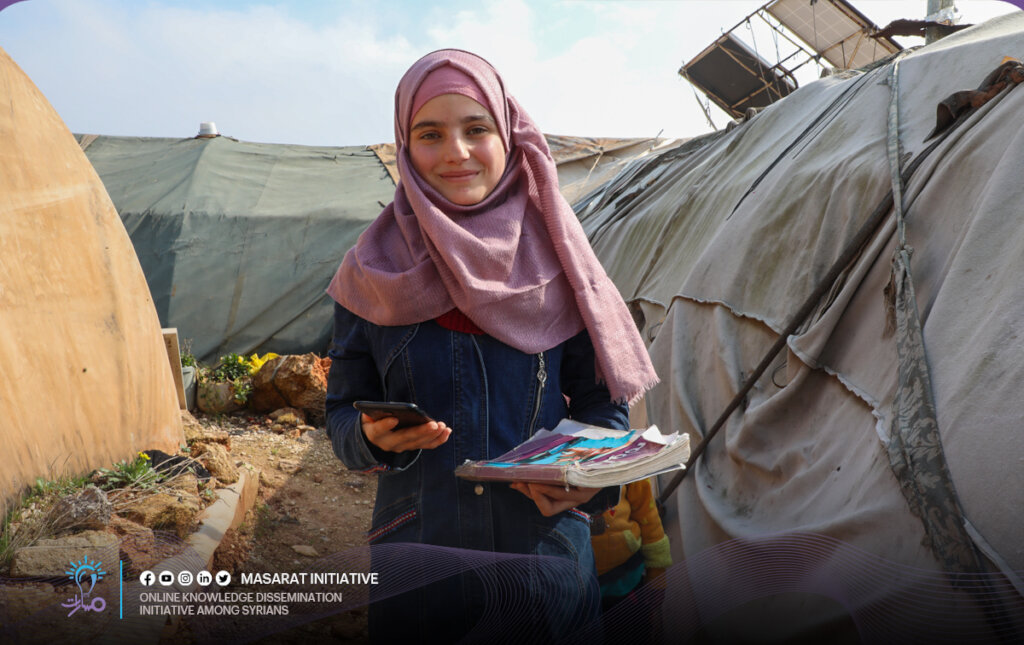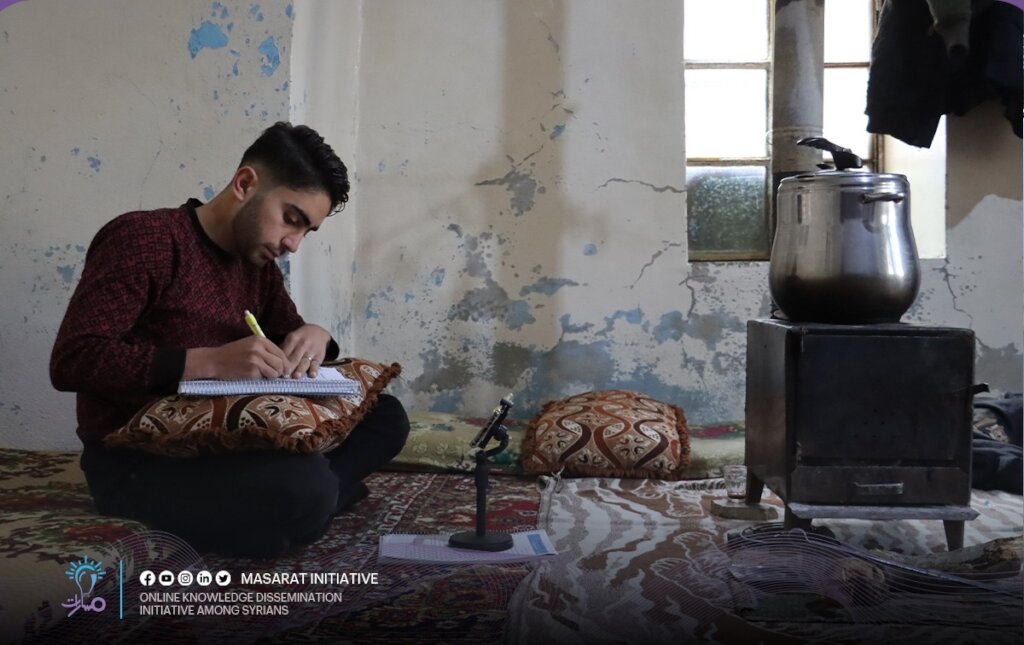Zakat al-Fitr is a Sadaqah prescribed for Muslims to be paid at the end of the holy month of Ramadan, serving as a purification for the fasting individual from sins and a donation to the poor and needy to bring joy to their hearts without them having to ask for it.
In this article, we explain the most important jurisprudential issues and inquiries related to Zakat al-Fitr to assist you in fulfilling this duty with a complete understanding that ends with you performing your duty as Allah Almighty has commanded.
Can Zakat al-Fitr be given to charitable organizations?
Islam allows the principle of delegation in discharging Zakat al-Fitr; a Muslim may discharge their Zakat at Eid al-Fitr to charitable associations or organizations that assist the poor and needy. It is stipulated that the Zakat must be distributed within its specified expenditures by most schools of thought in the form of food.

Can Zakat al-Fitr be given to a student of knowledge?
If the student of knowledge is eligible for Zakat, then its disbursement to them is permissible in Islam; and it is of great benefit.
At the Masarat Initiative for Free Education, we support our needy students by providing food baskets, and our doors are open for anyone who wishes to donate their Zakat al-Fitr to support our students and their families in camps and displaced students.

Where should a pilgrim discharge Zakat al-Fitr?
The basis for discharging Zakat al-Fitr is the country where the traveler finds themselves, but if the pilgrim wishes to discharge it in Mecca, that is permissible. It is also permissible to delegate someone to discharge it on their behalf; because Zakat al-Fitr essentially purifies the Muslim’s body and discharges it to a poor person to meet their need whenever that is achieved.
Discharging Zakat al-Fitr for a traveler
The ruling on Zakat al-Fitr for a traveler
The traveler should discharge Zakat al-Fitr in the country where they stayed on the night of Eid; because Zakat al-Fitr is a purification and cleansing for the body, related to the person; thus, it must be discharged in the same country where the traveler is present.
Ibn Qudamah said: “As for Zakat al-Fitr, it should be discharged in the country where it became obligatory upon him, whether his wealth is there or not.”
The place of discharging Zakat al-Fitr for a traveler
The principle of travel dictates that Zakat al-Fitr should be discharged in the country where the traveler resides. Sheikh Al-Uthaymeen, may Allah have mercy on him, said: “Zakat al-Fitr follows the person, so if the time of Fitr comes and you are in a country, then discharge Zakat al-Fitr while you are in that country.”
Discharging Zakat al-Fitr in a different country than the Zakat payer’s?
The basis of Zakat al-Fitr is to discharge it in the same country where the Muslim Zakat payer lives. However, Islam permits its discharge in another country if there is a need, such as the need of a poor person or to achieve a certain benefit for the poor; because the essence of Zakat al-Fitr is to prevent the poor from needing to ask on Eid night.

The ruling on Zakat al-Fitr for those who are not financially
capable Zakat al-Fitr is a mandatory charity for every Muslim, originally meant to enrich the poor on Eid day. Anyone who possesses the means to sustain themselves for a day and night, for them and their dependents, can afford to discharge Zakat al-Fitr as much as possible. However, those who are not financially capable of discharging Zakat al-Fitr or do not have sufficient means to meet their needs are not required to do so.
Is it permissible to discharge Zakat al-Fitr on behalf of another?
Discharging Zakat al-Fitr on behalf of another falls under the principle of delegation, which is permissible and available in Islamic Sharia. Therefore, it is permissible to discharge Zakat al-Fitr on behalf of another, but it is obligatory to do so after seeking their permission.
Zakat al-Fitr for the sick
The amount of Zakat al-Fitr for the sick
Zakat al-Fitr is obligatory for all Muslims, including the sick. The amount of Zakat al-Fitr for a sick person who broke their fast in Ramadan is feeding a poor person with 600 grams of wheat or rice, or its monetary equivalent.
Does Zakat al-Fitr apply to the sick?
Most Muslim scholars agree that Zakat al-Fitr is obligatory for all Muslims, citing Hadiths and statements of the Prophet indicating the generality of the obligation of Zakat. Ibn Umar (may Allah be pleased with them both) said: “The Messenger of Allah (peace be upon him) enjoined Zakat al-Fitr, a saa’ of dates, or a saa’ of barley, on every slave and free Muslim, male and female, young and old, and he commanded that it be given before people go out to the Eid prayer.” This implies that Zakat al-Fitr is also due on the young who are unable to fast, hence indicating that Zakat al-Fitr is due on the sick.
Zakat al-Fitr for children
Is Zakat al-Fitr obligatory on a newborn child?
Zakat al-Fitr is obligatory on every Muslim, young or old; even the fetus, if born crying before the night of Eid.
The amount of Zakat al-Fitr for a newborn
Zakat al-Fitr is estimated at a sa’ of food, whether rice, dates, raisins, or barley, for each Muslim individual. If a Muslim wishes to discharge Zakat al-Fitr on behalf of several people, it should be in the same amount for each person.
The ruling on Zakat al-Fitr for the fetus
Zakat al-Fitr is not obligatory for the fetus in its mother’s womb, as there is no evidence mentioning this. However, following the example of the noble companion Uthman bin Affan, who discharged Zakat al-Fitr for the fetus, is seen as an act of goodness and satisfaction to Allah Almighty.
Is Zakat al-Fitr obligatory for the fetus in its mother’s womb?
Zakat al-Fitr is not obligatory for the fetus in the womb, as Shariah rulings do not apply to the fetus. However, some prefer to do so as an act of drawing closer to Allah, citing the action of Uthman (may Allah be pleased with him), who liked to give Zakat al-Fitr for both the young and the old, including the unborn child in its mother’s womb.
Does the ruling on Zakat al-Fitr differ for a fetus into which the soul has been breathed and one that is less than that?
Zakat al-Fitr is not obligatory for the fetus, whether the soul has been breathed into it or not, as long as it is in its mother’s womb. However, the noble companion Uthman bin Affan used to discharge Zakat al-Fitr for everyone, young and old, including the fetus.
Zakat al-Fitr for the insane
Zakat al-Fitr is discharged for the insane, according to the general evidences found in the noble Hadiths. Abdullah ibn Umar ibn al-Khattab (may Allah be pleased with them both) said:
“The Prophet of Allah (peace be upon him) enjoined Zakat al-Fitr, a sa’ of dates or a sa’ of barley, on every slave and free Muslim, male and female, young and old, and he commanded that it be given before people go out to the Eid prayer.”
Zakat al-Fitr for the deceased
Zakat al-Fitr is only obligatory on a living Muslim up to the time when Zakat al-Eid becomes obligatory before the prayer. If a Muslim passes away after the time when Zakat al-Fitr becomes obligatory, it must be discharged on their behalf.
Is it permissible to discharge Zakat al-Fitr on behalf of the deceased?
If someone dies before the sunset of the last day of Ramadan, Zakat al-Fitr is not obligatory on them. The obligation of Zakat al-Fitr falls on those who witness the sunset of the last day of Ramadan; i.e., the night of Eid.
What is the ruling on discharging Zakat al-Fitr on behalf of the deceased?
There are no specific texts regarding Zakat al-Fitr for the deceased. However, if someone dies before the night of Eid, Zakat al-Fitr is not obligatory on them. If they die after witnessing the sunset of the last day of Ramadan and then pass away, Zakat al-Fitr becomes obligatory on them.
What is the ruling on discharging Zakat al-Fitr for a guest?
Islam commands the performance of Zakat al-Fitr for every capable, free Muslim who manages their own affairs, including guests. It is permissible for a Muslim to discharge Zakat al-Fitr on behalf of their guest who stayed with them during the month of Ramadan, provided they inform them and obtain their consent before discharging it.
Discharging Zakat al-Fitr for the family and relatives
Can Zakat al-Fitr be given to relatives?
By consensus of the four jurisprudential schools: Maliki, Shafi’i, Hanafi, and Hanbali, it is not permissible for a Muslim to give Zakat al-Fitr to relatives whom they are obligated to support, such as parents, children, and spouse. Other than these, discharging it is permissible.
Who is obligated to discharge Zakat al-Fitr on behalf of?
A Muslim is obligated to discharge Zakat al-Fitr on behalf of their household, for those whom they are responsible for their maintenance, such as the spouse, children, father, and mother. They are not responsible for discharging the charity of Fitr on behalf of their children who have their own wealth or whom they are not obligated to support.
Is it permissible to discharge Zakat al-Fitr on behalf of relatives?
If one wishes to discharge Zakat al-Fitr on behalf of relatives after obtaining their permission due to their lack of wealth, or to meet the need of a poor relative, this is permissible and falls under the principle of delegation in Islam.
The ruling on discharging Zakat al-Fitr for parents
Parents are among those whom the son is obligated to support, so it is permissible in Islam to discharge Zakat al-Fitr on behalf of the father and mother, and this is considered an act of righteousness and kindness towards them.
Is it permissible to give Zakat al-Fitr to an unmarried sister, spinster, or widow?
It is permissible for a Muslim to discharge Zakat al-Fitr to a needy sister who is eligible to receive Zakat funds, provided that her maintenance is not obligatory on the Muslim Zakat payer.
What is the ruling on discharging Zakat al-Fitr on behalf of a married son?
It is not permissible to give Zakat al-Fitr on behalf of children whose maintenance is not obligatory on the father. However, if the father voluntarily discharges Zakat al-Fitr on behalf of his children, this is permissible as an act of permission and delegation.
Is it permissible to give Zakat al-Fitr to a poor married brother?
It is permissible for a Muslim to discharge Zakat al-Fitr to a poor brother if their maintenance is not obligatory on them, thus it becomes a form of Zakat and maintaining family ties.
Is it permissible to give Zakat al-Fitr to sons?
If a son is independent of his parents and is poor or needy, it is permissible to give Zakat al-Fitr to him. However, if he is under the care of his father and the father is the one who supports him, it is not permissible to give Zakat al-Fitr to him.
Can Zakat al-Fitr be given to the mother or father?
It is not permissible for a Muslim to discharge Zakat al-Fitr to the mother or father because their maintenance is obligatory on the son.
Should a husband discharge Zakat al-Fitr on behalf of his wife?
The husband is obligated to discharge Zakat al-Fitr on behalf of his wife and children because Zakat al-Fitr is considered part of the maintenance he is obliged to provide for his family, provided he has surplus money sufficient for them for a day and night.
Masarat for Development and Education in Syria
In refugee camps and amid the pains of life, orphaned children live the dream of education. Their hopes were not so difficult.
Masarat works to confront the challenges of education in Northern Syria, providing free education and facilitating access to knowledge by providing an interactive online environment and non-interactive lessons through a learning management platform, in addition to a knowledge endowment specifically for the Masarat initiative on YouTube.
Masarat believes strongly in the power of education and its role in building more stable societies. The primary goal in Masarat is to expand the beneficiary base to make education a fundamental part of their lives.
You too can support and help children by sending your donations to them through the Masarat initiative, which documents every amount sent to it.
Your donation of Zakat funds reaches orphaned children in need of this money, achieving a measure of goodness and truthfulness before Allah, as He says: “Who is it that would loan Allah a goodly loan so He may multiply it for him many times over? And it is Allah who withholds and grants abundance, and to Him, you will be returned.”
Your donation to the children and youth is the epitome of the goodness you can offer them.
These orphans need education opportunities and empowerment after the loss of their provider to become positive and effective members of society.








